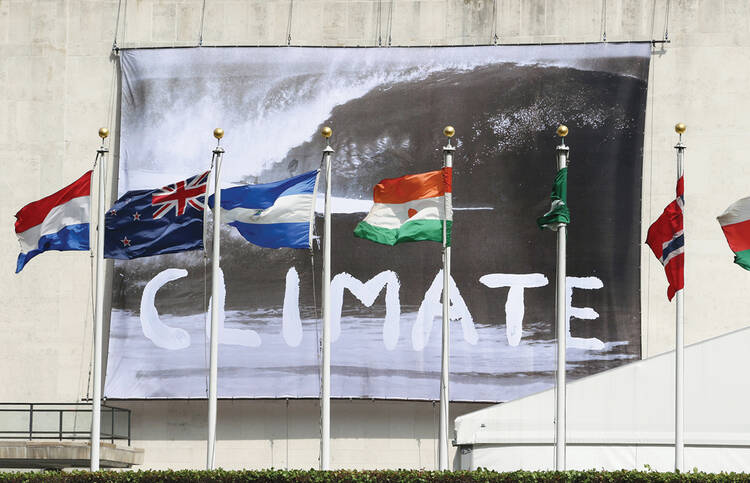Cardinal Peter Turkson, president of the Pontifical Council for Justice and Peace, took “Laudato Si’” on the road, presenting the “green encyclical” from Pope Francis to a packed audience during a special conference at the United Nations on June 30. Cardinal Turkson told his U.N. audience that “Laudato Si’” was not ultimately about climate change, “not just about the environment or treating it in isolation,” but a call to “prayerful contemplation of the natural and human ecology.” The encyclical asks us to consider “what kind of world do we want to leave to our children?”
He thinks this a challenge that the current generation is up to meeting, arguing that despite the difficulty of responding to climate change and other ecological threats it is not too late to “change course and change hearts.” But a process of global dialogue must begin, he said, one that can overcome entrenched ideologies and that remains driven toward concrete solutions and firm international commitments.
Cardinal Turkson emphasized the pope’s belief that the problems of poverty and ecological degradation represent an integral global challenge. “Pope Francis recalls how inseparable is the bond between care for nature and justice for the poor.... When we speak of the environment what we really mean is a relationship between nature and the societies which live in it,” he said. “We are part of nature.”
That means humankind confronts “not two separate crises—one environmental, one social—but one complex crisis that is both environmental and social.” Responding to that crisis must therefore address both components.
The cardinal added that critics who have already charged that the encyclical is antibusiness or antitechnology have misunderstood it. He explained that “Laudato Si’” represents a critique of a new paradigm of power arising from contemporary technological and economic realities. But, “business is a noble vocation,” he said, which can “continue the work of God” in cooperation with creation. Pope Francis, he said, challenges business people to “use their vocation to benefit and lift up the poor,” the same challenge he issues to people at the forefront of technological change. “Like all things, technology can be abused,” Cardinal Turkson said.
“Laudato Si’” is a call for global dialogue to find concrete solutions to the world’s economic and ecological problems, but it is also a call for dialogue between faith and reason, according to the cardinal—one that can be mutually beneficial. “Faith can expose the blind side of reason,” he said, “and reason challenges faith to be concrete and relevant in life.”
Christiana Figueres, executive secretary of the U.N. Framework Convention on Climate Change, welcoming Cardinal Turkson on behalf of U.N. Secretary General Ban Ki-moon, expressed her personal gratitude for the “magnificent encyclical that His Holiness Pope Francis has blessed us with.” Figueres pointed out this generation’s unique capacity and responsibility to respond to the twofold crisis of global poverty and climate change.
“We are the very first generation that has all the tools, all the science, all the capital,” she said, “everything it takes to eradicate poverty.” She added, at the same time this generation may be the last one capable of mitigating the worst effects of climate change before the process develops an ecological momentum that will become unstoppable.








